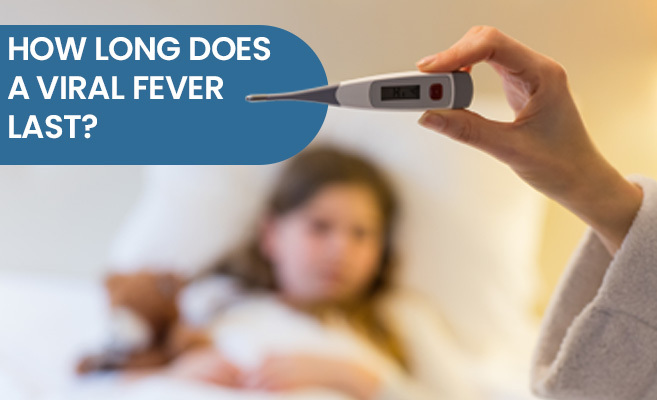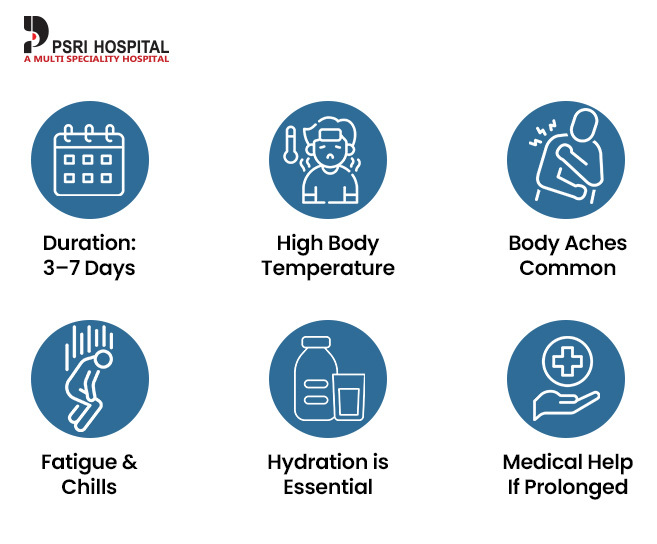How Long Does a Viral Fever Last?

A sudden rise in body temperature, fatigue, body aches, and chills—these symptoms point toward one of the most common health concerns: viral fever. But amidst the discomfort and confusion, a pressing question often arises:
Whether you’re a concerned parent, a caregiver, or a professional trying to navigate this ailment, understanding the viral fever duration is crucial. This blog breaks down everything you need to know—from causes and symptoms to best practices and recovery timelines—making it a go-to resource for healthcare professionals and everyday readers alike.

What Is a Viral Fever?
Viral fever is a term used to describe a group of viral infections that lead to elevated body temperature. Unlike bacterial fevers, viral fevers are caused by various viruses that enter the body and trigger an immune response. These viral infections can be airborne, waterborne, or transmitted through contact with infected individuals or surfaces.
Common Types of Viral Fever:
- Influenza (Flu)
- Dengue fever
- Chikungunya
- COVID-19
- Common cold (caused by rhinoviruses)
- Viral gastroenteritis (stomach flu)
- Adenovirus infections
- Measles and mumps
Each type of viral fever presents slightly different symptoms and complications, making early diagnosis essential.
Typical Viral Fever Duration: What to Expect
So, how long does a viral fever last?
In general, most viral fevers last 3 to 7 days. However, the exact duration can vary based on several factors:
- Type of virus involved
- Age and health condition of the patient
- Body’s immune response
- Timeliness and quality of care received
Breakdown of Duration by Type:
| Type of Viral Fever | Average Duration |
|---|---|
| Common Cold | 3 – 5 Days |
| Flu (Influenza) | 5 – 7 Days |
| Dengue | 7 – 10 Days |
| Chikungunya | 7 – 14 Days |
| Covid-19 | 7 – 14 Days |
| Viral Hepatitis | 2 – 6 Weeks |
It is essential to note that while the fever may subside within days, other symptoms like fatigue, muscle aches, and weakness may persist for several more days or even weeks, depending on the virus.
Key Phases of Viral Fever
1. Incubation Period
This is the period between exposure to the virus and the appearance of symptoms. During this time, the virus multiplies inside the body without showing visible signs of illness. Depending on the virus, this period can last from 1 to 4 days, though some viruses like hepatitis may take weeks.
2. Symptomatic Phase
This is when the symptoms become apparent—high fever, chills, cough, fatigue, sore throat, body aches, and sometimes gastrointestinal distress. This phase typically lasts 3 to 7 days, but may extend in cases of more severe infections.
3. Recovery Phase
As the immune system fights off the virus, symptoms start to diminish. While the fever usually subsides, fatigue and general weakness may remain for 2 to 5 additional days, especially in elderly patients or those with weakened immunity.
When Does It Stop Being Just a Viral Fever?
Although viral fevers are usually self-limiting, complications can arise, especially in vulnerable groups like infants, elderly individuals, and people with underlying health conditions. Prolonged fever or worsening symptoms can indicate a secondary infection or a more serious condition that requires immediate medical attention.
Red Flags to Watch For:
- Fever persists beyond 7 days
- Breathing difficulties or chest pain
- Continuous vomiting or diarrhea
- Severe headache, neck stiffness
- Rashes with bleeding or bruising
- Altered mental status or unconsciousness
- Pain in joints, especially in dengue or chikungunya
In such cases, seeking treatment from the best hospital in Delhi, such as PSRI, ensures accurate diagnosis and expert intervention.
Treatment: Managing Viral Fever Effectively
Most viral fevers do not require specific antiviral treatment. Instead, care focuses on symptom management and supportive therapies that aid the body’s natural immune response.
Home-Based Care:
- Rest: Adequate sleep and minimal physical exertion help conserve energy for immune function.
- Hydration: Drink plenty of fluids like water, coconut water, herbal teas, and soups to prevent dehydration.
- Fever Reduction: Use doctor-prescribed medications such as paracetamol or ibuprofen. Avoid aspirin in children.
- Nutrition: Eat a balanced diet with fruits, vegetables, and easily digestible meals rich in vitamins and minerals.
When to Seek Hospital Care:
- High-grade fever unresponsive to medication
- Signs of dehydration (dry mouth, dizziness, low urine output)
- Infants, elderly, and pregnant women with persistent symptoms
- Underlying chronic conditions like diabetes, asthma, or cardiac issues
- Rapid decline in general health
Viral Fever in Children vs Adults
Children:
- Their immune systems are still developing, making them more susceptible to frequent and intense viral infections.
- Fever may rise quickly and often triggers concern in parents.
- Recovery is generally quicker, provided proper rest and hydration are ensured.
Adults:
- Typically have a more robust immune response but may take longer to recover if co-morbidities exist.
- Working professionals may ignore symptoms, risking prolonged illness and complications.
- Self-medication or over-the-counter treatments without consulting a doctor should be avoided.
Myths vs Facts About Viral Fever Duration
| Myth | Fact |
|---|---|
| Viral fever always lasts 2 – 3 days | Some fevers may last up to 2 weeks, depending on the viruses |
| Antibiotics helps reduce viral fever | Antibiotics are ineffective against viruses |
| No fever means you are fully recovered | Other symptoms may linger even after fever subsides |
| Only kids get prolonged viral fevers | Adults can experience prolonged symptoms too |
| High fever is always dangerous | Mild to moderate fever can help the immune system work |
| Viral fever is contagious only during symptoms | Many viruses are contagious even before symptoms start |
Best Practices for Faster Recovery
Following these expert-recommended strategies can help reduce viral fever duration and prevent relapses:
Do:
- Get sufficient rest and sleep
- Drink fluids throughout the day
- Take doctor-prescribed medication only
- Monitor body temperature 2–3 times daily
- Use lukewarm sponge baths for high fever relief
- Maintain personal hygiene
Don’t:
- Take antibiotics without a prescription
- Skip meals or consume junk food
- Stay in air-conditioned rooms for long periods if shivering
- Delay medical consultation beyond 5–7 days of fever
Precautionary Measures to Prevent Viral Fevers
Prevention is always better than cure, especially in the case of contagious diseases.
Hygiene Practices:
- Wash hands with soap for at least 20 seconds
- Avoid sharing personal items like towels or utensils
- Cover mouth and nose when sneezing or coughing
Environmental Care:
- Clean living and working spaces regularly
- Use mosquito repellents and nets
- Avoid stagnant water accumulation
Immune Support:
- Get timely vaccinations (flu shots, COVID-19 boosters)
- Include immune-boosting foods like garlic, turmeric, ginger, citrus fruits, and leafy greens
- Reduce stress and get regular physical activity
Why Timely Diagnosis Matters?
Viral fever is often overlooked due to its commonality. However, ignoring persistent or high-grade fever can result in severe health risks. Early and accurate diagnosis helps:
- Rule out bacterial or parasitic infections
- Avoid unnecessary antibiotic use
- Initiate appropriate care pathways
- Prevent complications such as dehydration, seizures, or respiratory failure
This is where facilities like PSRI, a top hospital in Delhi NCR, offer significant value through their expert diagnostics and multidisciplinary care approach.
Conclusion: Be Informed, Act Smart
Understanding how long a viral fever lasts is more than just a matter of curiosity—it can influence your approach to recovery and health management. Most viral fevers resolve within a week, but individual factors can lead to longer durations.
Being aware of symptoms, monitoring recovery phases, and following best practices not only shortens the viral fever duration but also prevents recurrence and complications. When in doubt, timely consultation with professionals from a top hospital in Delhi NCR like PSRI Hospital can make all the difference.
Stay proactive, stay informed, and remember—early care is the first step to full recovery.
Frequently Asked Questions:
Q1. What is considered a viral fever?
Ans. A viral fever is a rise in body temperature due to a viral infection affecting the body’s immune system.
Q2. Is a viral fever contagious?
Ans. Yes, viral fevers are generally contagious and can spread through air, direct contact, or contaminated surfaces.
Q3. Can viral fever go away on its own?
Ans. Most mild viral fevers resolve on their own within a few days with rest and hydration.
Q4. When should I consult a doctor for viral fever?
Ans. Seek medical help if fever lasts more than 3-4 days, exceeds 102°F, or is accompanied by breathing issues, rashes, or severe weakness.
Q5. Are antibiotics effective for viral fever?
Ans. No, antibiotics are ineffective against viruses and should not be used unless a bacterial infection is also present.
Q6. How can I manage viral fever at home?
Ans. Stay hydrated, get plenty of rest, and use doctor-recommended fever reducers like paracetamol.

 Book An Appointment
Book An Appointment Virtual Consultation
Virtual Consultation





